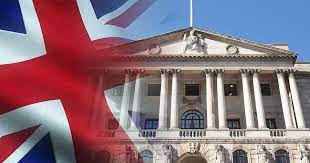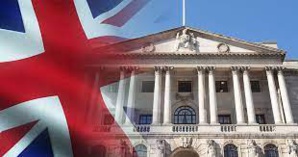UK Prime Minister Liz Truss' massive power bill bailout has given the Bank of England a temporary boost in its fight against inflation, but it still appears likely that interest rates will increase significantly later this month.
According to economists, Truss's tariff cap, which was announced on Thursday and is anticipated to cost 100 billion pounds ($116 billion) or more over two years, will allow inflation to peak up to five percentage points lower than originally predicted.
The high point of the recent inflation surge would still be significantly above the BoE's 2% target, however, at 11%, which is the new estimate of several analysts. This would do little to allay policymakers' worries about inflation expectations becoming entrenched in the economy.
Due to the national day of mourning following the passing of Queen Elizabeth, the BOE's policy decision was postponed from September 15 to September 22; however, economists said they did not anticipate the week-long delay to change the policy outlook.
Following Truss's price cap announcement on Thursday, a preliminary Reuters poll of 30 economists found that the majority thought rates would rise by 50 basis points this month.
Only twice since 1995 has the BoE raised the Bank Rate by that much, matching the increase from last month. Since Truss's announcement, bets on an even larger 75 basis-point hike have sharply decreased.
Furthermore, since households will be thousands of pounds better off than they would have been without Truss's power tariff cap and proposed tax cuts, inflation pressures are likely to develop.
The BoE might increase rates more than initially anticipated in order to counter that.
"I suspect that the size of the package is probably going to weigh on the minds of Monetary Policy Committee members," George Buckley, an economist with Nomura, said.
On September 15, he anticipated a rate increase of 0.5 percentage points, with additional increases to come.
Huw Pill, the chief economist at the BoE, stated this week that the institution would make sure that government spending did not lead to inflation.
The BoE might delay its rate hikes in 2023 longer than other central banks, according to James Smith at ING.
"It probably means they're going to be looking at rate cuts much less urgently than the Fed or some of the other central banks which might be cutting rates by the middle of next year," Smith said.
According to Samuel Tombs of the consultancy Pantheon Macroeconomics, the BoE's predicted recession may be narrowly avoided, paving the way for a rate hike of half a percentage point next week and another in November.
That would raise the Bank Rate to 2.75%, its highest level since 2008, where Tombs predicted it would stay. This is still well below market predictions of more than 4 per cent.
According to Philip Shaw of Investec, there is a chance that the government's stimulus drive and the BoE's rate hikes will ultimately pull in different directions, increasing the risk of policy confusion.
"The fact that the chancellor and the governor appear to be engaging in twice-weekly conversations is encouraging from the point of view of policy coordination," Shaw said.
The Treasury announced on Wednesday that the BoE Governor Andrew Bailey and the new finance minister Kwasi Kwarteng will initially meet twice a week to coordinate economic support.
Later this month, Kwarteng is anticipated to make an emergency budget announcement that includes tax reductions.
The inflation-fueling decline of the pound, which this week fell to its lowest level against the US dollar since 1985, is also likely to raise BoE interest rates. Part of this decline was caused by worries about the amount of borrowing that Truss planned to do.
To combat inflation, other central banks are also aggressively raising interest rates. This week, the European Central Bank raised its benchmark interest rate by the largest amount ever—75 basis points.
The BoE is about to begin selling down the stockpile of British government bonds that it started amassing after the global financial crisis of 2007–2008 in addition to raising rates.
The MPC announced last month that, "subject to economic and market conditions being judged appropriate," it would hold a confirmatory vote on the start of the sales in September.
According to some economists, the recent turmoil in the bond market may cause the BoE's sale plan to stall.
(Source:www.nasdaq.com)
According to economists, Truss's tariff cap, which was announced on Thursday and is anticipated to cost 100 billion pounds ($116 billion) or more over two years, will allow inflation to peak up to five percentage points lower than originally predicted.
The high point of the recent inflation surge would still be significantly above the BoE's 2% target, however, at 11%, which is the new estimate of several analysts. This would do little to allay policymakers' worries about inflation expectations becoming entrenched in the economy.
Due to the national day of mourning following the passing of Queen Elizabeth, the BOE's policy decision was postponed from September 15 to September 22; however, economists said they did not anticipate the week-long delay to change the policy outlook.
Following Truss's price cap announcement on Thursday, a preliminary Reuters poll of 30 economists found that the majority thought rates would rise by 50 basis points this month.
Only twice since 1995 has the BoE raised the Bank Rate by that much, matching the increase from last month. Since Truss's announcement, bets on an even larger 75 basis-point hike have sharply decreased.
Furthermore, since households will be thousands of pounds better off than they would have been without Truss's power tariff cap and proposed tax cuts, inflation pressures are likely to develop.
The BoE might increase rates more than initially anticipated in order to counter that.
"I suspect that the size of the package is probably going to weigh on the minds of Monetary Policy Committee members," George Buckley, an economist with Nomura, said.
On September 15, he anticipated a rate increase of 0.5 percentage points, with additional increases to come.
Huw Pill, the chief economist at the BoE, stated this week that the institution would make sure that government spending did not lead to inflation.
The BoE might delay its rate hikes in 2023 longer than other central banks, according to James Smith at ING.
"It probably means they're going to be looking at rate cuts much less urgently than the Fed or some of the other central banks which might be cutting rates by the middle of next year," Smith said.
According to Samuel Tombs of the consultancy Pantheon Macroeconomics, the BoE's predicted recession may be narrowly avoided, paving the way for a rate hike of half a percentage point next week and another in November.
That would raise the Bank Rate to 2.75%, its highest level since 2008, where Tombs predicted it would stay. This is still well below market predictions of more than 4 per cent.
According to Philip Shaw of Investec, there is a chance that the government's stimulus drive and the BoE's rate hikes will ultimately pull in different directions, increasing the risk of policy confusion.
"The fact that the chancellor and the governor appear to be engaging in twice-weekly conversations is encouraging from the point of view of policy coordination," Shaw said.
The Treasury announced on Wednesday that the BoE Governor Andrew Bailey and the new finance minister Kwasi Kwarteng will initially meet twice a week to coordinate economic support.
Later this month, Kwarteng is anticipated to make an emergency budget announcement that includes tax reductions.
The inflation-fueling decline of the pound, which this week fell to its lowest level against the US dollar since 1985, is also likely to raise BoE interest rates. Part of this decline was caused by worries about the amount of borrowing that Truss planned to do.
To combat inflation, other central banks are also aggressively raising interest rates. This week, the European Central Bank raised its benchmark interest rate by the largest amount ever—75 basis points.
The BoE is about to begin selling down the stockpile of British government bonds that it started amassing after the global financial crisis of 2007–2008 in addition to raising rates.
The MPC announced last month that, "subject to economic and market conditions being judged appropriate," it would hold a confirmatory vote on the start of the sales in September.
According to some economists, the recent turmoil in the bond market may cause the BoE's sale plan to stall.
(Source:www.nasdaq.com)






